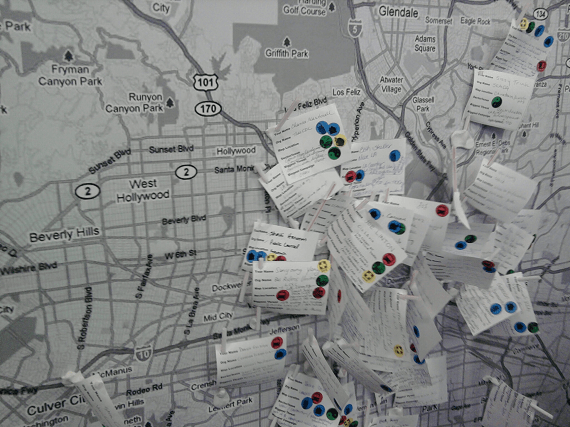
Yesterday, Tuesday July 12th 2011, marked the first meeting of a fledgling coalition re-examining the way Southern California does Transit Oriented Development (TOD.) Over 100 people, representing nearly as many organizations, attended the Los Angeles Summit on Community-Oriented T.O.D. which took place at the Asian Pacific American Legal Center near downtown Los Angeles.
The event was organized by the Bus Riders Union, East L.A. Community Corporation, Green L.A. Coalition, Little Tokyo Service Center, Natural Resources Defense Council, Public Counsel, Southeast Asian Community Alliance, and Strategic Actions for a Just Economy. Attendees included representatives from various local, regional, and statewide organizations focused on housing, transportation, health, the environment and more.
From the event announcement:
Transit-oriented development—or T.O.D.—is the new planning buzzword … but what does it mean for our communities?
The idea behind T.O.D. is promoting housing/retail development near LA’s new rail stations and other major transit points. Like "smart growth" and "new urbanism," T.O.D. is being hailed as an answer to our cities’ traffic congestion problems and environmental pollution because it would encourage new people to live a car-free lifestyle …
But who would benefit from the new development?
How will we make sure that renters and low-income people of color already living near transit—and using transit every day— will not continue to be displaced?
How will we ensure that T.O.D. will include affordable housing and
other community-serving projects?Join us as we learn about T.O.D. and create strategies to ensure that low-income people of color, and not the developers, play a lead role in state, regional and local decision-making around the kinds of development that take place in our communities.
Many of the groups in the room had struggled with proposed Transit-Oriented Developments that were not responsive to community needs, mostly where proposed TODs would foster gentrification and displacement. Some of those stories have been covered here at L.A. Streetsblog, for example the proposed Lorenzo Project. Though many of these campaigns have been successful in securing benefits for affected communities, the campaigns have been waged project by project. Participants expressed the hope that a new coalition could bring similar campaigns together to learn from each other, and to be able to develop broader and more proactive solutions.
Initial discussions focused around agreeing on a shared set of principles, and on building connections between participants. Will this new coalition be able to steer Los Angeles Transit-Oriented Development into a healthy and equitable place? Only time will tell.





